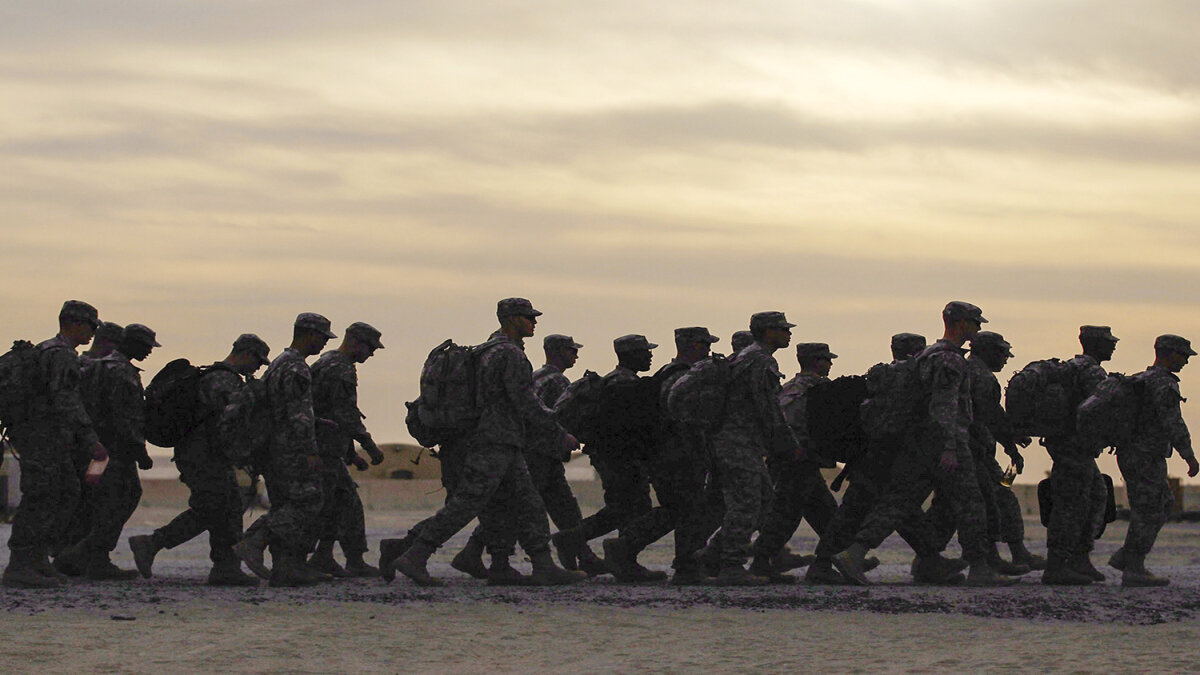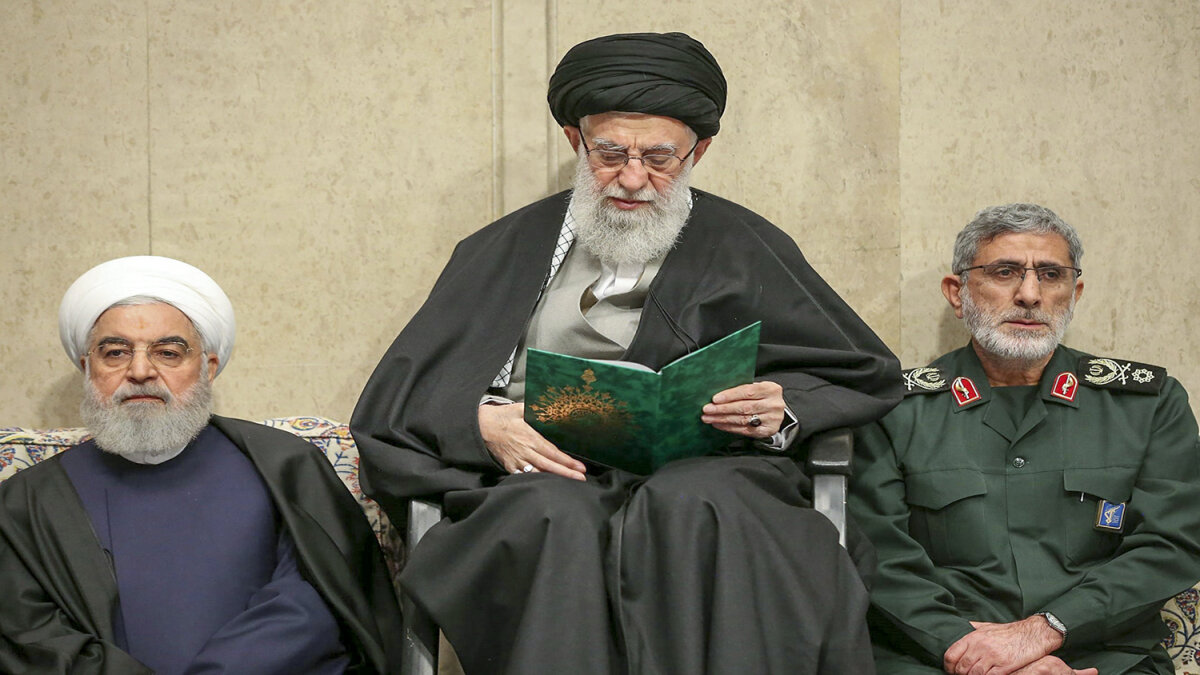After Suleimani
jerusalem
On January 17, United States President Donald Trump gave a moment-by-moment account of the event that starkly interrupted decades of American weakness toward Iran.
“They’re together, sir,” he said military officers told him in the White House Situation Room. “‘Sir, they have 2 minutes and 11 seconds.’ No emotion. ‘Two minutes and 11 seconds to live, sir. They’re in the car. They’re in an armored vehicle. Sir, they have approximately one minute to live, sir. Thirty seconds. Ten, nine, eight ….’”
“Then, all of a sudden, boom. ‘They’re gone, sir. Cutting off.’”
This had transpired on January 3, after the president authorized the killing of Iranian arch-terrorist Qassem Suleimani. As head of Iran’s Islamic Revolutionary Guard Corps Quds Force—a designated Foreign Terrorist Organization—Suleimani had orchestrated much of the chaos in the Middle East over the past 20 years, including the deaths of hundreds of Americans in Iraq and elsewhere. In 2019, Iran and its proxies downed an expensive American drone, attacked or impounded oil tankers inside international waters, launched drones and cruise missiles at the most important oil facility in the world in Saudi Arabia, and fired numerous missiles at American bases in Iraq, all without any retribution from the Trump administration.
On Dec. 27, 2019, Kataib Hezbollah, an Iranian proxy inside Iraq, fired more missiles at a U.S. base in Iraq. But this time, they killed an American citizen. This crossed President Trump’s red line. Two days later, American jets hit five Kataib Hezbollah targets inside Iraq and Syria, killing 25 members of the militia. Iran responded by orchestrating a mass protest at the U.S. Embassy in Baghdad, torching some of the outbuildings. President Trump immediately ordered in 100 marines to reinforce the compound. He posted online that this would not be a repeat of the Benghazi fiasco in 2012 when American soldiers were told to stand down as terrorists stormed an American diplomatic compound in Libya, killing Ambassador Christopher Stevens and three other Americans.
In his characteristic style, the president posted online that Iran “will pay a very big price! This is not a warning, it is a threat. Happy New Year!”
Three days later, Mr. Trump took Iran completely off guard and conducted a drone air strike against Suleimani, who was returning to Baghdad to orchestrate another Iranian response. The strike killed him, an Iraqi militia leader, the commander of Kataib Hezbollah and six others.
According to Foundation for Defense of Democracies vice president Jonathan Schanzer, “Suleimani’s killing was, without a question, the most consequential act of Trump’s presidency. After decades of the U.S. letting the Islamic Republic get away with murder, the Trump administration made it clear that America would no longer allow the regime to hide behind its militias.” As Schanzer related, U.S. policy had been to treat militias such as Hezbollah in Lebanon, the Houthis in Yemen, Hamas in Gaza, and various Shiite forces in Iraq as separate entities, even though they have sworn allegiance to Iran.
In reality, Suleimani led all of them. For two decades, he had orchestrated their attacks against America, against Israel, and inside Syria, where a nine-year civil war has resulted in almost half a million deaths.
Despite having the opportunity, the two previous American administrations refused to attack Iranians, let alone Suleimani. The Bush administration feared Iranian retaliation, and the Obama administration actually allied with Suleimani against the Islamic State, allowing his militias to virtually take over Iraq in the process. President Trump brought clarity to the situation and struck the chief operator of Iran’s killing machine.
Now that Suleimani is gone, what can we expect in the Middle East in the future? Here are five trends to watch for, based on Bible prophecy.
1 | Iran Will Be Temporarily Chastened
Iran will be far more careful in how it chooses to attack American interests in the future. In response to Suleimani’s death, Iran fired more than a dozen missiles from Iranian territory into an American base in Iraq. This was a symbolic attack using precision-guided munitions that did not hit the American side of the base, killed no Americans, was possibly preceded by a warning, and was publicly followed by an Iranian official saying that Iran’s retaliation was now complete. The Iranian regime told its people that this was a mighty blow to the Americans, but the rest of the world recognized it as a weak response intended to deescalate the situation and avoid further American punishment.
The nature of the Iranian strike was an acknowledgment that President Trump’s action temporarily restored U.S. deterrence against Iranian attacks. That doesn’t mean Iran won’t still engage in skirmishes against U.S. interests, but it does mean that it realizes it can no longer act with impunity.
Watch for Iran to hold back on its attacks against the U.S., but only temporarily. Iran has already announced that it is giving an extra $200 million from its sovereign wealth fund to the Quds Force. Suleimani is dead, but the Iranian regime and Iranian terrorism live on, as does Iran’s quest for dominance.
2 | The United States Will Exit Iraq
In the hours following Iran’s retaliatory strike, Ayatollah Ali Khamenei gave a thunderous speech broadcast throughout Iran stating that “the people of Iran slapped America in the face,” but he also said, “This kind of [Iranian] attack is not enough. The U.S. must be uprooted from the region because they brought destruction to this region.”
Earlier that week, Iraqi military joint operations received a letter from the U.S. Combined Joint Task Force announcing that America was removing its forces from Iraq. Iraqi Prime Minister Adel Abdul Mahdi said he also received a copy. The U.S. government claimed that the unsigned letter was a draft that should have never been sent. But the draft’s existence and its being leaked show that the U.S. is seriously considering a pullout.

Furthermore, many of President Trump’s most vocal supporters believe the best time to leave is now. Journalist Lee Smith wrote in the New York Post on January 7 that Suleimani’s killing “was a strategic victory for President Trump and an opportunity to roll it into a political masterstroke, as well—the immediate and complete withdrawal of U.S. troops from Iraq.” He acknowledged that Iran has more influence in Iraq than the U.S. does, but if the U.S. leaves, Sunni Iraqis will better withstand Shiite Iran. That is unlikely, but such a rationale could be applied to use Suleimani’s death to “get out of the Iraqi quagmire on a high note.”
Trumpet editor in chief Gerald Flurry has forecast a full Iranian takeover of Iraq. Since 1992, he has pinpointed Iran as the fulfillment of this Bible prophecy: “And at the time of the end shall the king of the south push at him: and the king of the north shall come against him like a whirlwind, with chariots, and with horsemen, and with many ships; and he shall enter into the countries, and shall overflow and pass over” (Daniel 11:40).
In his booklet The King of the South (free upon request), Mr. Flurry shows how Iraq is prophesied to join this “king of the south,” or radical Islam, led by Iran. Thus he has forecast for decades that Iraq will eventually fall to Iran. A December 1994 article asked, “Is Iraq About to Fall to Iran?” That headline was repeated in 2003, when the U.S. ousted Iraq’s Saddam Hussein from power.
Removing U.S. forces will not presage a new era of Iraqi nationalism to defy the Iranian regime. Rather, granting Khamenei his wish will have the opposite effect: Iraq will be swallowed up by Iran.
3 | Europe Will Enter the Middle East
President Trump campaigned on America no longer fighting “stupid wars” in far-flung places. He wants to remove American forces from the Middle East, but he does not want to hand over the region to Iran. In announcing Suleimani’s death, the president made some statements with massive strategic implications.
On January 8, President Trump said: “Today, I am going to ask nato to become much more involved in the Middle East process. Over the last three years, under my leadership, our economy is stronger than ever before and America has achieved energy independence. These historic accomplishments changed our strategic priorities. These are accomplishments that nobody thought were possible. And options in the Middle East became available. We are now the number one producer of oil and natural gas anywhere in the world. We are independent, and we do not need Middle East oil.”
Most of the nations in nato are European. Germany, France and Britain have a combined force of around 6,000 military personnel scattered through Iraq, Syria, Afghanistan, Lebanon and the Persian Gulf. But European nations have been reluctant to fight in the Middle East without logistical support and leadership from the U.S. The United States, which left enormous amounts of equipment behind during the Obama administration’s 2011 withdrawal, could hand over its bases and infrastructure to European nations this time, giving Europe an incredible opportunity to take leadership over its own fate in the Middle East.
Germany has already indicated it could fill the void in Iraq. On January 10, Germany-Foreign-Policy.com quoted the chairman of the cdu-csu Parliamentary Group for Foreign Policy, Roderich Kiesewetter, as saying that he could imagine the U.S. withdrawing at the same time that “we Europeans are gaining [greater] weight in the region within the framework of a trans-Atlantic burden-sharing.”
Based on Bible prophecy, expect Europe to become more involved in the Middle East, taking over from the U.S. as the main force countering Iran’s aggressive, terroristic foreign policy. Daniel 11:40 prophesies a clash between the king of the south and “the king of the north.” In The King of the South, Mr. Flurry writes regarding this verse: “The stage is being set for an Islamic group of nations to be led by Iran as the prophesied king of the south, which will push at the king of the north, the European Union. … The blatantly bold and aggressive foreign policy of Iran must lead to war. It will either conquer or be conquered. Bible prophecy makes it clear that Iran will be conquered—but not at the hand of America and Britain. … A new superpower is rising in the European Union.”
As the United States withdraws, watch for a resurgent Europe to slowly fill the void in the Middle East, which will create the volatility that culminates in the Daniel 11:40 clash.
4 | Iran Will Lose Its Grip on Syria
The United States Dec. 29, 2019, air strike targeted Iran’s proxy Kataib Hezbollah in Iraq, which was notable and widely reported, but also in neighboring Syria, which went largely unreported.
The fact that Kataib Hezbollah members could be killed in both countries shows that Iran is using this vast territory as a single battle space. Over the last decade, Iran has dominated affairs from Lebanon through Syria and into Iraq. The chief architect of this strategy of control was Qassem Suleimani, who bolstered Bashar Assad’s Syrian regime using tens of thousands of Shiite mercenaries from Afghanistan, Lebanon, Iraq, Pakistan and Iran and personally met with President Vladimir Putin in Russia to obtain support. According to the Associated Press, when Syria’s largest city, Aleppo, was fully recaptured in 2016, the man who visited the city in triumph was not Assad, but Suleimani.

Suleimani is gone, but the Syrian war rages on, with Turkey becoming increasingly involved. An opportunistic Turkey may take advantage of Suleimani’s absence, and Iran’s fair-weather friend Putin may decide to use the moment to push for a more independent policy in Syria, one in which it no longer allies with Iran.
We at the Trumpet have forecast for decades that Iran’s power would diminish significantly inside Syria. An end-time prophecy found in Psalm 83 describes a number of Arab nations that ally, not with the Iranian “king of the south,” but with “Assyria,” biblically prophetic language for a German-led Europe. This prophecy reveals that Iran will lose control of Syria. With the mastermind of Iran’s Syria policy dead, watch for Iran’s grip on the nation to weaken.
5 | Iran Will Focus on North Africa and the Red Sea
Just hours after Suleimani’s assassination, Brig. Gen. Ismail Qaani was installed as the new commander of Iran’s Islamic Revolutionary Guard Corps Quds Force. When Qaani served as deputy commander, much of his role involved distribution of funds and military shipments to Iran’s proxies across the region. While the charismatic, Arabic-speaking Suleimani focused on Syria and Lebanon, Qaani focused on Afghanistan and Africa.
Qaani traveled to Africa regularly, often with top Iranian politicians, including a November 2009 trip with then President Mahmoud Ahmadinejad. According to a 2012 biography by the American Enterprise Institute for Public Policy Research, Qaani considered the Arab Spring “as continuity of ‘the path of Iran’s Islamic revolution.’”

Qaani’s background could indicate a shift in Iran’s strategy.
Daniel 11 indicates that Iran and its radical Islamist allies will “push” at Germany and Europe and provoke full-scale war. Verses 42-43 show that when Europe finally confronts Iran, it will war with the king of the south, not just in Iran but in Egypt, Libya and Ethiopia, indicating that they and perhaps other Islamic North African nations will have allied with Iran.
Iran already has extensive influence in North Africa. It has a firmly established position in Yemen via its Houthi proxy. Iran-backed radical Islamist groups now run rampant in Libya. The Muslim Brotherhood is strong in Egypt. Iran’s tentacles stretch as far south as Kenya. This is Qaani’s area of expertise.
